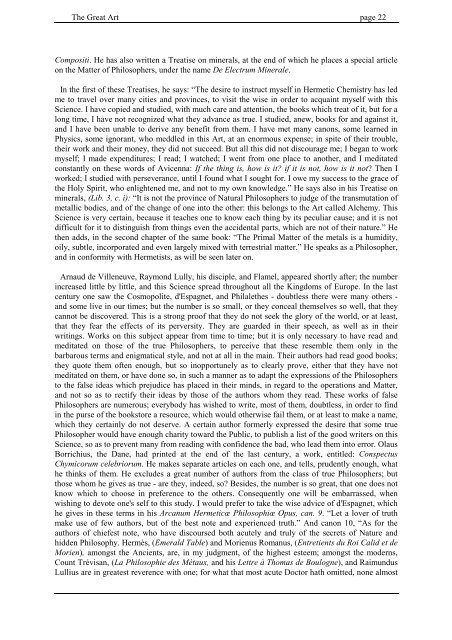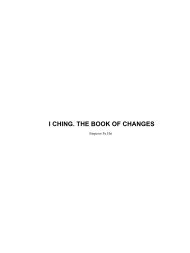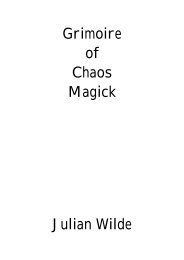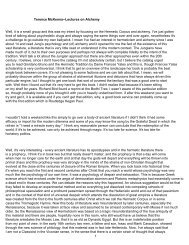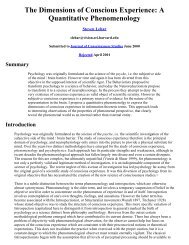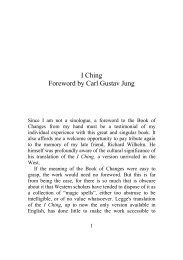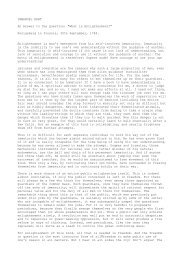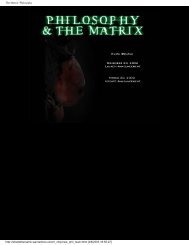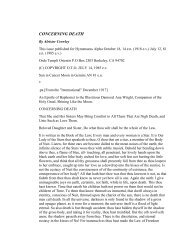Pernety - A Treatise On The Great Art.pdf - cyjack.com
Pernety - A Treatise On The Great Art.pdf - cyjack.com
Pernety - A Treatise On The Great Art.pdf - cyjack.com
Create successful ePaper yourself
Turn your PDF publications into a flip-book with our unique Google optimized e-Paper software.
<strong>The</strong> <strong>Great</strong> <strong>Art</strong> page 22Compositi. He has also written a <strong>Treatise</strong> on minerals, at the end of which he places a special articleon the Matter of Philosophers, under the name De Electrum Minerale.In the first of these <strong>Treatise</strong>s, he says: “<strong>The</strong> desire to instruct myself in Hermetic Chemistry has ledme to travel over many cities and provinces, to visit the wise in order to acquaint myself with thisScience. I have copied and studied, with much care and attention, the books which treat of it, but for along time, I have not recognized what they advance as true. I studied, anew, books for and against it,and I have been unable to derive any benefit from them. I have met many canons, some learned inPhysics, some ignorant, who meddled in this <strong>Art</strong>, at an enormous expense; in spite of their trouble,their work and their money, they did not succeed. But all this did not discourage me; I began to workmyself; I made expenditures; I read; I watched; I went from one place to another, and I meditatedconstantly on these words of Avicenna: If the thing is, how is it? if it is not, how is it not? <strong>The</strong>n Iworked; I studied with perseverance, until I found what I sought for. I owe my success to the grace ofthe Holy Spirit, who enlightened me, and not to my own knowledge.” He says also in his <strong>Treatise</strong> onminerals, (Lib. 3, c. i): “It is not the province of Natural Philosophers to judge of the transmutation ofmetallic bodies, and of the change of one into the other: this belongs to the <strong>Art</strong> called Alchemy. ThisScience is very certain, because it teaches one to know each thing by its peculiar cause; and it is notdifficult for it to distinguish from things even the accidental parts, which are not of their nature.” Hethen adds, in the second chapter of the same book: “<strong>The</strong> Primal Matter of the metals is a humidity,oily, subtle, incorporated and even largely mixed with terrestrial matter.” He speaks as a Philosopher,and in conformity with Hermetists, as will be seen later on.Arnaud de Villeneuve, Raymond Lully, his disciple, and Flamel, appeared shortly after; the numberincreased little by little, and this Science spread throughout all the Kingdoms of Europe. In the lastcentury one saw the Cosmopolite, d'Espagnet, and Philalethes - doubtless there were many others -and some live in our times; but the number is so small, or they conceal themselves so well, that theycannot be discovered. This is a strong proof that they do not seek the glory of the world, or at least,that they fear the effects of its perversity. <strong>The</strong>y are guarded in their speech, as well as in theirwritings. Works on this subject appear from time to time; but it is only necessary to have read andmeditated on those of the true Philosophers, to perceive that these resemble them only in thebarbarous terms and enigmatical style, and not at all in the main. <strong>The</strong>ir authors had read good books;they quote them often enough, but so inopportunely as to clearly prove, either that they have notmeditated on them, or have done so, in such a manner as to adapt the expressions of the Philosophersto the false ideas which prejudice has placed in their minds, in regard to the operations and Matter,and not so as to rectify their ideas by those of the authors whom they read. <strong>The</strong>se works of falsePhilosophers are numerous; everybody has wished to write, most of them, doubtless, in order to findin the purse of the bookstore a resource, which would otherwise fail them, or at least to make a name,which they certainly do not deserve. A certain author formerly expressed the desire that some truePhilosopher would have enough charity toward the Public, to publish a list of the good writers on thisScience, so as to prevent many from reading with confidence the bad, who lead them into error. OlausBorrichius, the Dane, had printed at the end of the last century, a work, entitled: ConspectusChymicorum celebriorum. He makes separate articles on each one, and tells, prudently enough, whathe thinks of them. He excludes a great number of authors from the class of true Philosophers; butthose whom he gives as true - are they, indeed, so? Besides, the number is so great, that one does notknow which to choose in preference to the others. Consequently one will be embarrassed, whenwishing to devote one's self to this study. I would prefer to take the wise advice of d'Espagnet, whichhe gives in these terms in his Arcanum Hermeticœ Philosophiœ Opus, can. 9. “Let a lover of truthmake use of few authors, but of the best note and experienced truth.” And canon 10, “As for theauthors of chiefest note, who have discoursed both acutely and truly of the secrets of Nature andhidden Philosophy. Hermès, (Emerald Table) and Morienus Romanus, (Entretients du Roi Calid et deMorien), amongst the Ancients, are, in my judgment, of the highest esteem; amongst the moderns,Count Trévisan, (La Philosophie des Métaux, and his Lettre à Thomas de Boulogne), and RaimundusLullius are in greatest reverence with one; for what that most acute Doctor hath omitted, none almost


